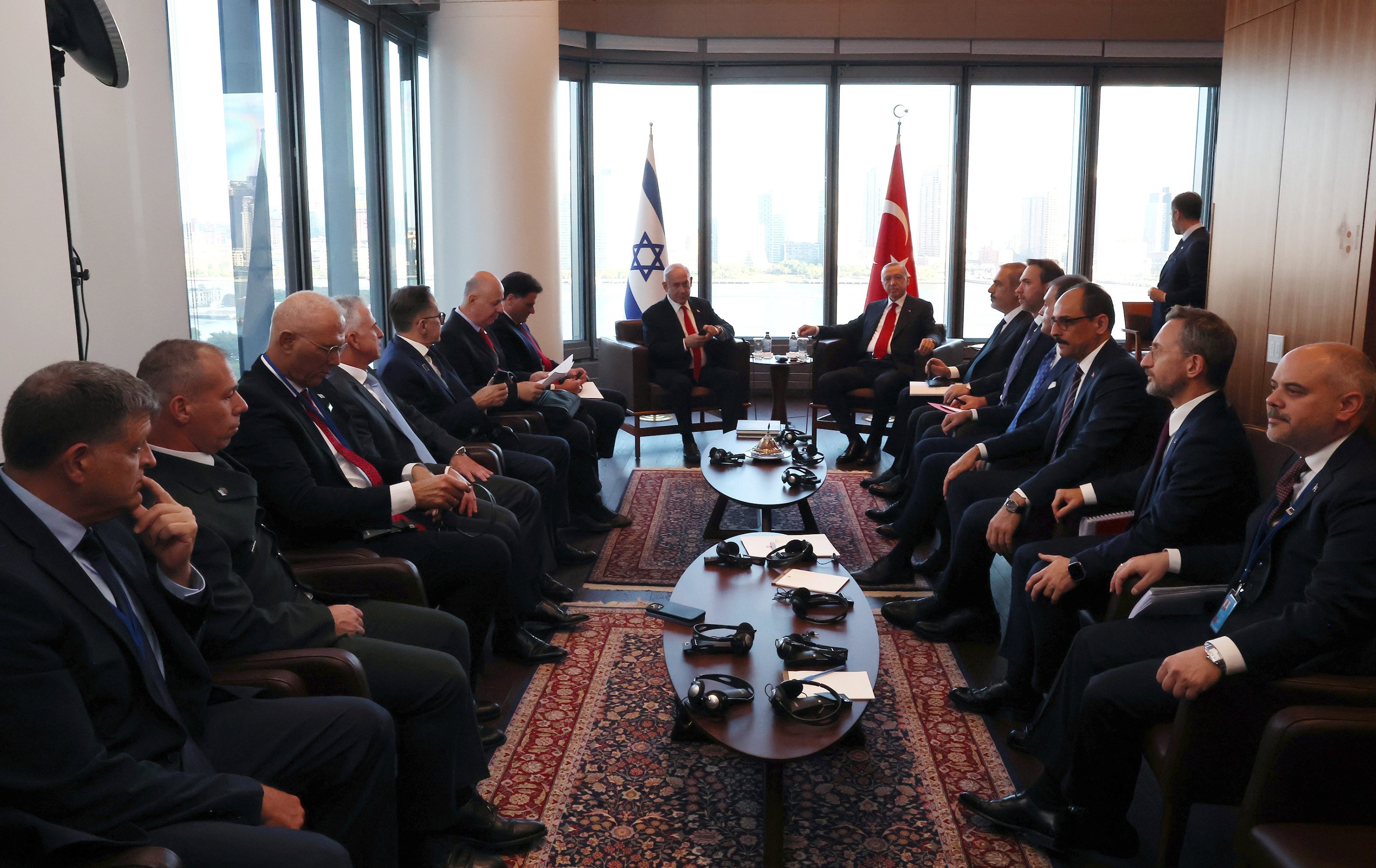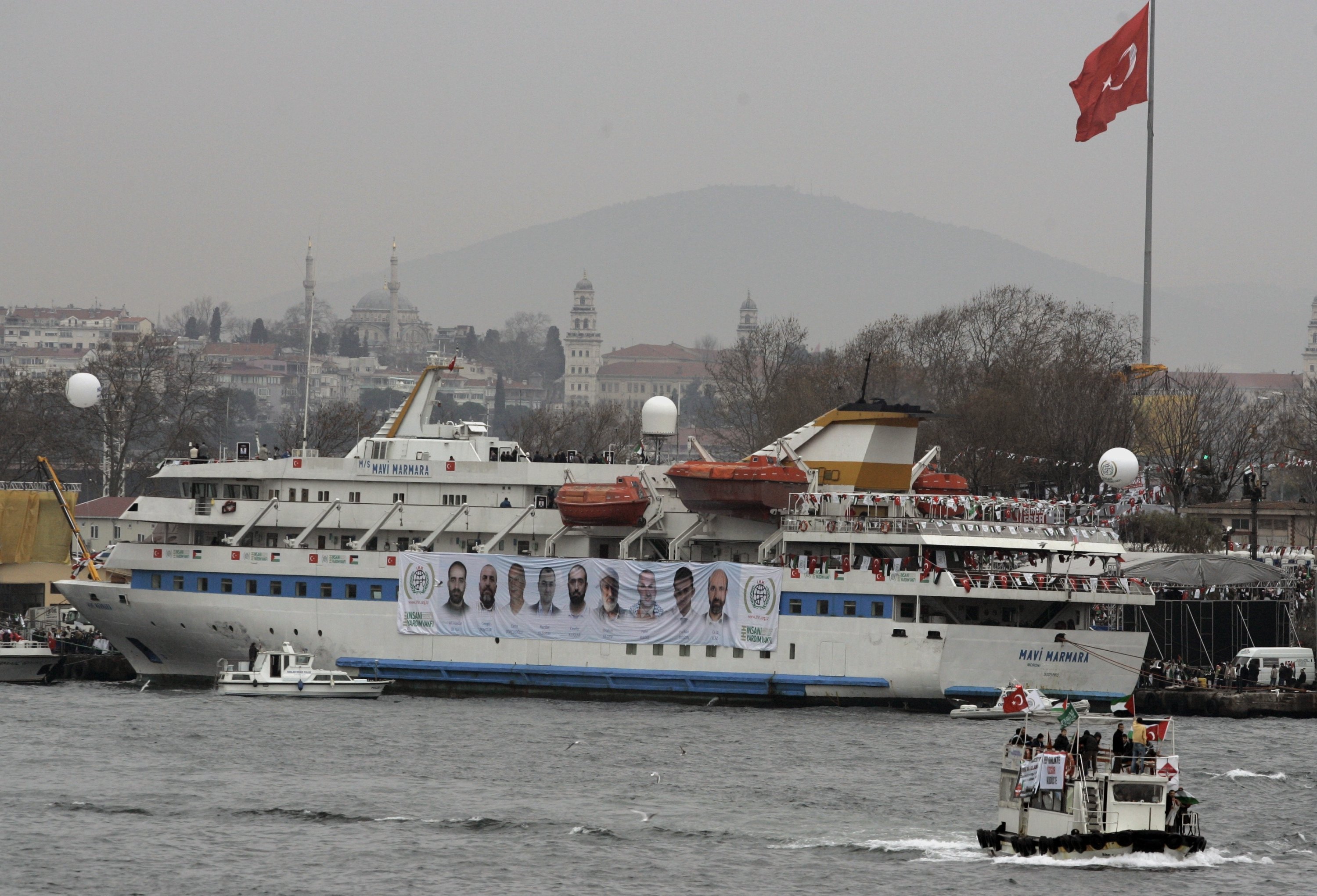© Turkuvaz Haberleşme ve Yayıncılık 2026
In the world of geopolitics, chance encounters can spark significant change. Against the backdrop of the recent United Nations General Assembly (UNGA) in New York City, two leaders from seemingly different nations, according to some, President Recep Tayyip Erdoğan and Israeli Prime Minister Benjamin Netanyahu, recently came together in a meeting that could mark a critical point in their countries' relationship. This gathering, marked by “warmth” and “optimism” for a key expert, has left a mark on the path ahead for Türkiye and Israel.
The air in New York was charged with anticipation as, on Sept. 20, Erdoğan welcomed Netanyahu at the Turkish House (Türkevi), a diplomatic hub of Türkiye in the metropolis. The symbolism of this meeting was undeniable, as the two leaders from nations that have experienced their fair share of diplomatic turbulence were now extending olive branches, and the world watched with admiration.
Marc Schneier, a respected American rabbi and representative of the U.S. Jewish community, was not only an observer but a participant in this remarkable gathering. In an interview with Daily Sabah, Rabbi Schneier provided unique insights into the atmosphere that pervaded the room during the Erdoğan-Netanyahu encounter. His words were laden with optimism, and he described the meeting as "positive and heartfelt," an affirmation that went beyond mere diplomatic pleasantries.
"The talks had a very friendly and open atmosphere," he said. "Several important topics, including energy and trade, with ministers from related fields present, were discussed,” he noted.
“However,” he highlighted, “the most important aspect was the genuine messages from both leaders to create a path toward peace.”

The words from Schneier, a senior rabbi at the Hampton Synagogue in New York's Westhampton, were spoken just a few hours before Erdoğan, in response to journalists' questions during an interview before his departure from the U.S., expressed, "There's nothing like peace."
The “positivity” the rabbi sensed at the meeting was not just a one-time event, but rather a larger trend. It signifies a sea of change in the historically complex relationship between Türkiye and Israel. More importantly, the rabbi emphasized that it hints at a future brimming with promise for bilateral relations, adding, “The ties have been in good shape for over a decade.”
According to Schneier, "One of the most compelling indicators of this positive shift is Netanyahu's planned visit to Ankara." He pointed out that if this visit materializes, it will mark “the second milestone” in recent times for improved relations, recalling that “the first milestone” was Israeli President Isaac Herzog's visit to the Turkish capital in March 2022 – an event following a series of phone diplomacy efforts that signified an apparent willingness on both sides to rebuild bridges that had long been neglected.
Back in March 2022, Schneier, a prominent figure in Türkiye-Israeli relations, worked with senior Turkish officials to make the historic Herzog-Erdoğan gathering and its pre-talks a reality.
Experts agree with the American rabbi that Herzog's visit was crucial since it occurred many years after the tense relations between Türkiye and Israel reached a low point due to the tragic 2010 Mavi Marmara incident. During this unfortunate event, Israeli forces killed 10 Turkish citizens on a pro-Palestinian activist ship that was trying to penetrate the Gaza Strip blockade.

However, Rabbi Schneier believes the best moment in this friendship, “the creme de la creme” as he says, has yet to come, as Erdoğan's anticipated visit to Israel is on the horizon. Erdoğan is expected to visit Israel soon, which, according to the rabbi, shows “the commitment of both nations to move forward in a new direction.”
"It's an important visit that carries immense significance for not only the leaders but also their citizens who have been longing for a stronger era of cooperation and understanding," said the rabbi. "Erdoğan aims to build relations as he did with Herzog last year."
During their last interview in New York, the Turkish leader confirmed that Netanyahu may visit Türkiye soon, while a statement from the Israeli leader’s office stated that they both agreed to visit each other's countries "soon." However, no formal announcement has been made yet.
Schneier, the author of “Sons of Abraham” and “Shared Dreams,” is an opinion leader who talks about the connection between Jews and Muslims who descend from "the sons of Prophet Abraham." He thinks that Judaism and Islam are the most similar religions among the Abrahamic faiths, defining it as a “shared fate.”
In 1989, Schneier founded the Foundation for Ethnic Understanding, whose initial purpose was to mend relations between America's black and Jewish communities. For 17 years, he has worked to improve relations between Muslims and Jews around the world.
During a Zoom call with Daily Sabah, Schneier commended the American-Jewish community's proactive efforts to enhance relations between Ankara, Tel Aviv and their nations.
"For instance, after the fatal earthquakes in February, the community quickly activated its networks to provide monetary aid to the victims in the affected regions of Türkiye," remembered the rabbi. He further added, "The State of Israel promptly dispatched military units to those areas."

On Feb. 6, seismic events of magnitude 7.7 and 7.6 shook southeastern Turkish provinces, killing over 50,000 people and affecting over 13.5 million.
Schneier also praised the Jewish community in Türkiye, stating that their leaders and representatives have regularly communicated positively with the Turkish government, which helps improve relationships between both parties. He pointed out that Erdoğan has consistently expressed his commitment to addressing the needs of the Jewish diaspora and offering his support to the community within the country.
Just on Sept. 15, the Turkish leader re-expressed the country's dedication to promoting cultural diversity and tolerance in a message celebrating Rosh Hashanah, the Jewish New Year. He stated, “Different religious beliefs, love and tolerance are enriching elements of our society.”
Schneier also talked about the danger to humanity posed by the increasing prevalence of xenophobia, racism, Islamophobia and anti-Semitism, particularly in Europe.
"Europe has a serious history of xenophobia," he stated, adding that neither Jewish people nor Muslims have had such a record in their history. This, according to him, is proof that both nations should work together to combat hate against humanity.
The rabbi echoed Erdoğan's Hanukkah statement from last year. On Dec. 18, 2022, in a written message to send his Hanukkah greetings to the Jewish people worldwide, the Turkish leader stated, “While anti-Semitism, Islamophobia and xenophobia threaten social peace today in many countries as well as global peace, the unity and solidarity all our citizens display in our country with mutual respect, love and understanding, without any discrimination, sets an exceptional example to the entire world.”
The positive reconciliation between Ankara and Tel Aviv is occurring at a time when the world, especially the Middle East, is caught in a wave of normalization among regional states amid a multitude of challenges, including geopolitical tensions and economic uncertainties.
Every country in the region, from Saudi Arabia to Qatar and Türkiye to Israel, is reportedly in a period of normalization. States are ignoring their existing obstacles or chronic problems in an attempt to mend their broken relations separately. Just recently, Ankara and Riyadh signed key agreements to boost their friendship, while Tel Aviv and Riyadh have greenlighted a positive era to prevail in their future.
Experts believe that the Türkiye-Israel relations are taking shape in line with this evolving geopolitical dynamic. The American rabbi connects the current worldwide situation with the situation between Türkiye and Israel; however, he believes there's more to it as both nations have maintained a positive trend for more than 10 years, despite some issues, including the disagreements regarding the Palestine case.
The Palestinian issue remains a significant hurdle to the improvement of relations between Türkiye and Israel.
Türkiye has long supported the Palestinian cause with a firm and unwavering stance, expressing concern about Israel's treatment of Palestinians, specifically the blockade of the Gaza Strip and the construction of illegal settlements in the occupied West Bank and East Jerusalem.
Turkish officials stress that it's crucial to have a just and comprehensive settlement of the Palestinian matter, following international law and U.N. resolutions, to attain enduring peace and stability in the Middle East.
This commitment was reaffirmed by Erdoğan during the recent UNGA as well.
